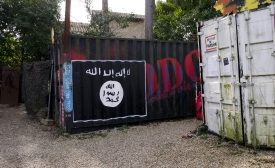islamic state

Philip Seib cautions against unfounded optimism about the decline of IS.
Secretary of State John Kerry went to Hollywood this week in search of ideas to counter the Islamic State’s appeal. And to be fair, he was onto something: the power of narratives and emotional appeal of stories have a role to play in beating back a hateful ideology. And American moviemakers know how to tell great stories with global appeal, as foreign box office sales can attest. The medium is right, but the message — or rather, the “American brand” — is not.
The State Department is revamping its floundering efforts to curb recruiting by the Islamic State and other terrorist groups, senior U.S. officials tell Foreign Policy, in response to growing dissatisfaction in the White House and Congress at existing attempts to stop the spread of the extremists’ ideology. The changes ordered by Secretary of State John Kerry, which have not previously been reported, shift significant power to a single bureau at the State Department tasked with coordinating all counter-extremism efforts.
The Obama administration on Friday announced an overhaul of its efforts to respond to online propaganda from the Islamic State after months of acknowledgments that it had largely failed in its attempts to counter extremist recruitment and exhortations to violence on social media. The administration has emphasized that it needs the assistance of some of the nation’s biggest technology companies, and a group of top White House and national security officials flew to California on Friday to plead their case with executives.

The case for an official Kurdish nation.
Professor Joseph Nye and former Deputy Secretary of State Richard Armitage correctly pointed out that to solve the biggest problems we need a mix of hard and soft power — which they termed “smart power.” […] What would a smart power campaign directed against the challenges represented by the Islamic State look like?

A proposal for military action to aid refugees.







